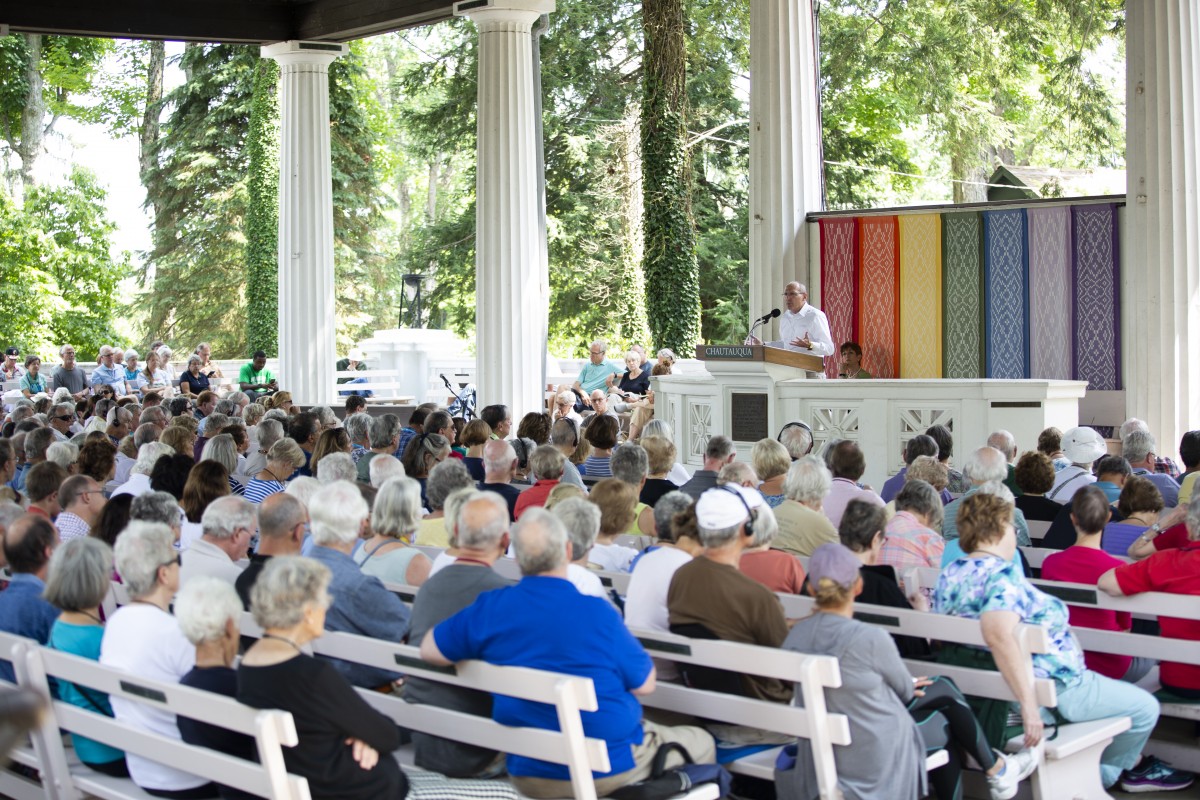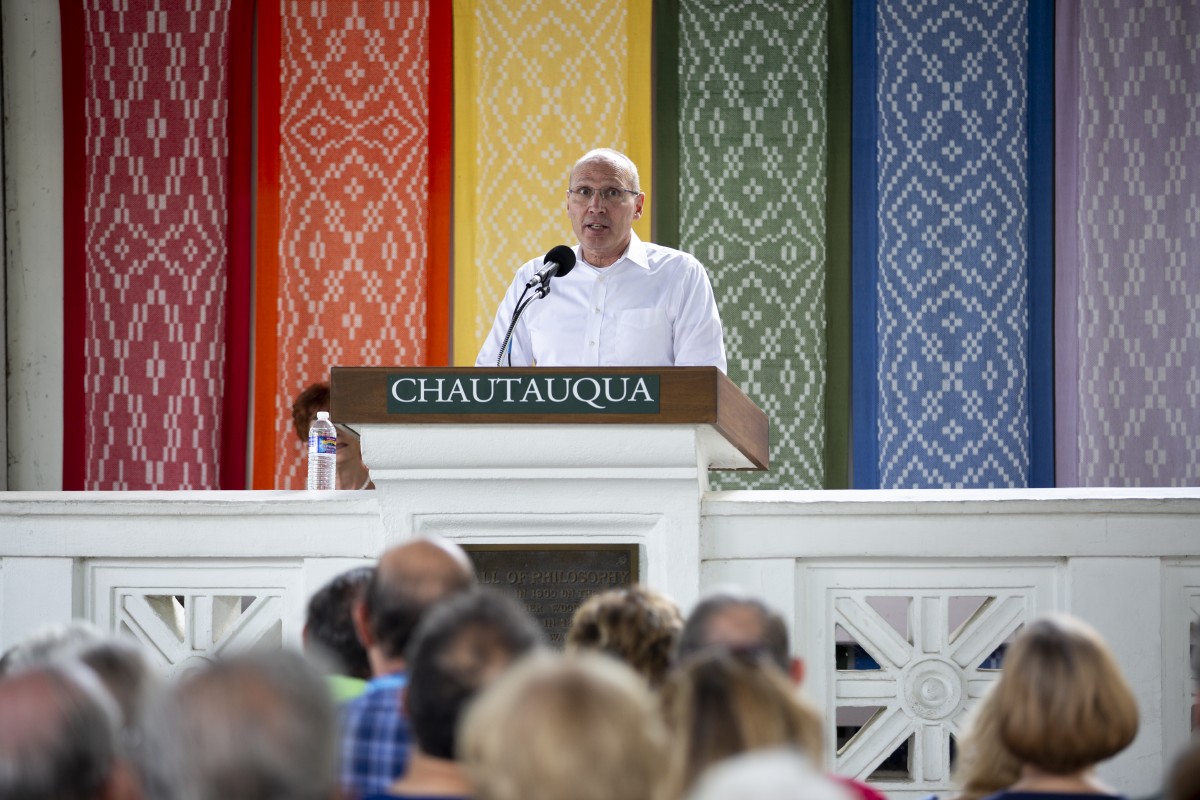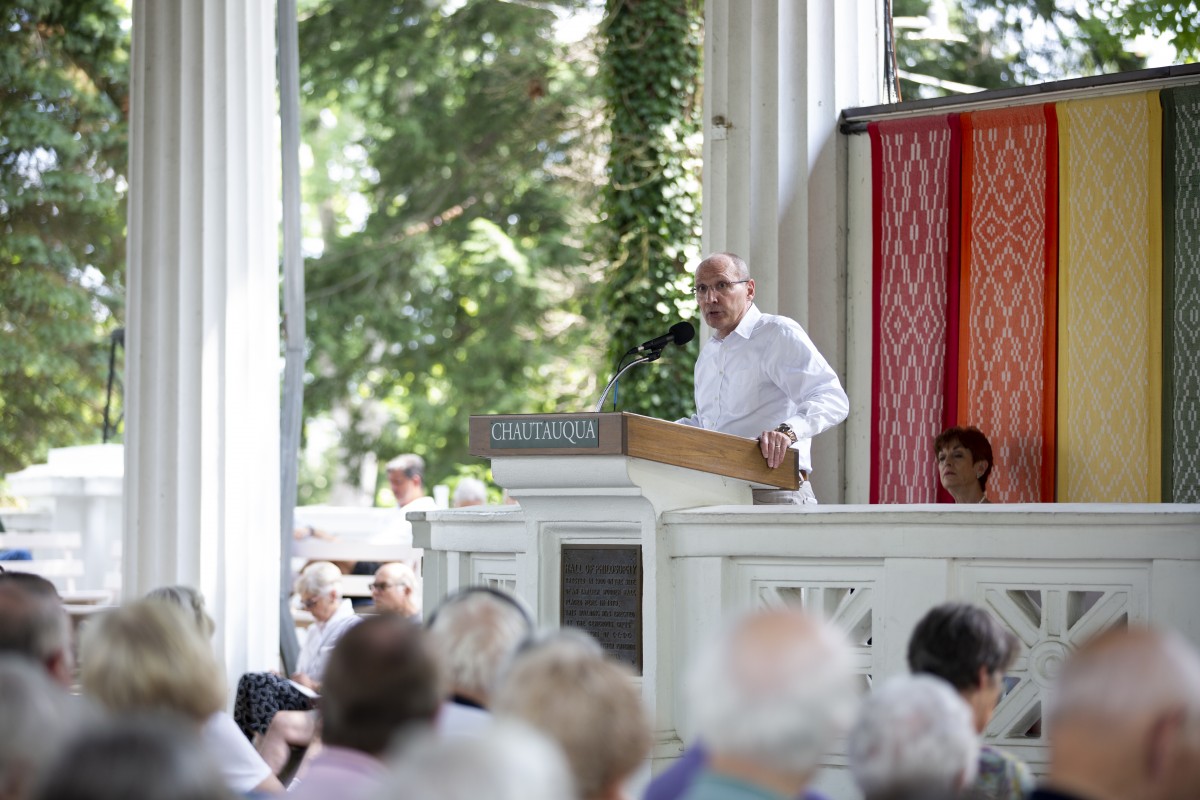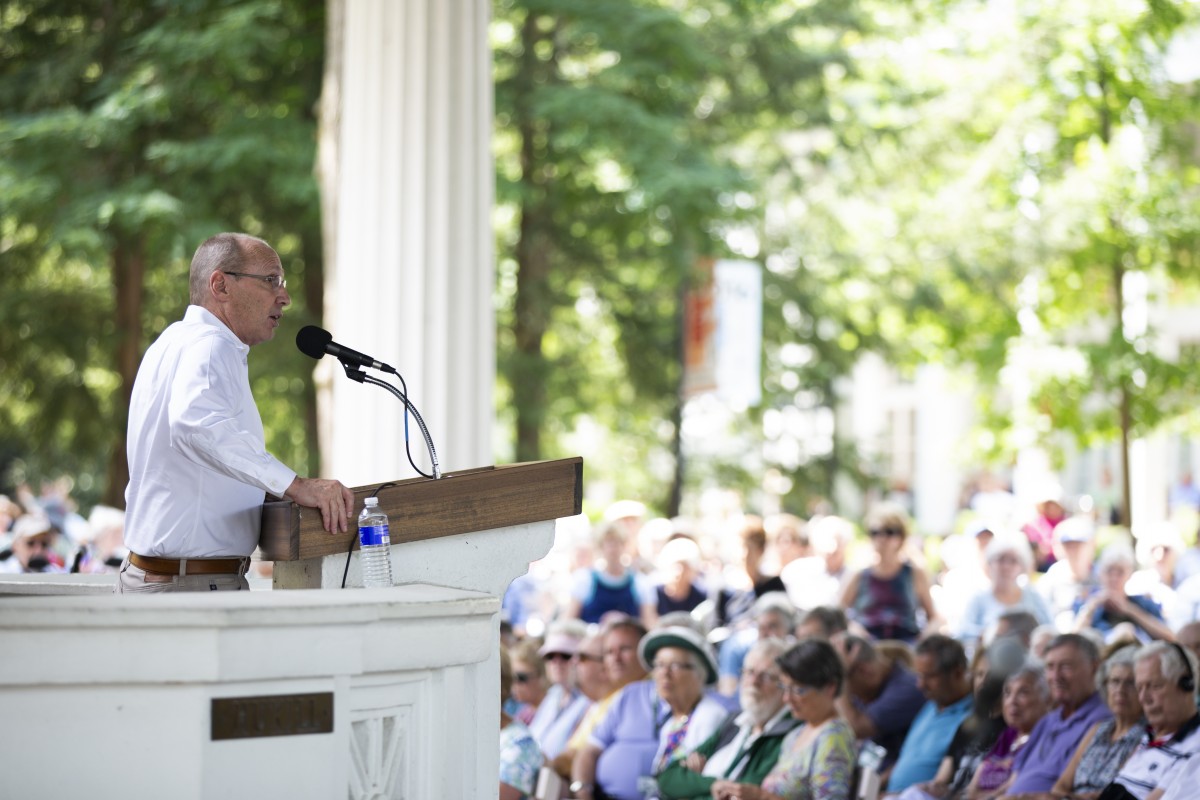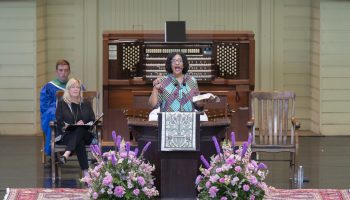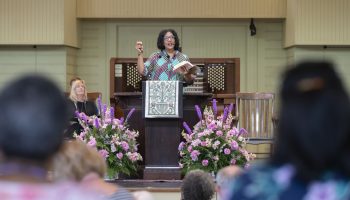Pluralism calls for not only tolerance, but also a taste and desire for difference. A pluralistic society, like that of the United States, accepts a wide range of variance, but Frederick Mark Gedicks said in terms of religion, there are definitive limits.
At 2 p.m. Thursday, Aug. 9, in the Hall of Philosophy, Gedicks, the Guy Anderson Chair and professor of law at Brigham Young University, gave his lecture, “Three Problems of Pluralism,” as part of Week Seven’s interfaith theme, “Let Them Eat Cake? Defining the Future of Religious Freedom in the U.S.”
Gedicks said America’s commitment to religious pluralism is not boundless, as some beliefs and practices receive no accommodation.
“Those whose beliefs condemn modern medicine are criminally prosecuted when they don’t take their children to be treated, and their children can become seriously ill and pass away,” Gedicks said. “Religious polygamists who marry underage girls are in prison for child abuse, and Amish businesses are obliged to pay taxes in violation of their self-sufficient faith.”
Gedicks compiled the bounds of pluralism into three “limits.”
The first limit is if a religious accommodation generates harm to other people who don’t benefit from the accommodation.
That limit dates back to the late 1800s. Gedicks said some leaders of the early United States thought it was “deeply immoral” to tax all citizens to support state-sponsored religion — religions to which many citizens did not belong.
“It was simply wrong, they thought, to tax Baptists, Methodists, skeptics and other religious dissenters to support the Anglican establishment in the South or congregationalism in New England,” he said.
Not only did these dissenters reject the theology of the churches they were taxed to support, but these churches often took those tax dollars and used them to underwrite a system that excluded dissenters from government and that oppressed them under the law.
Gedicks said that oppression suggested a “basic principle of political morality.”
“No one should have to pay the cost of practicing someone else’s religion,” he said. “A person who adheres to a particular faith should not call upon the government to force others to underwrite the cost of (their) religious practice.”
That principle of political morality is commonly referred to as the Third-Party Harm Doctrine, a component of the religious liberty protected by the Establishment Clause. Gedicks reworded that principle in the “language of economics.”
“We would say the Establishment Clause prohibits believers from externalizing the cost of their faith in the same way anti-pollution laws prevent industry from externalizing the cost of polluting a water supply on which others rely,” Gedicks said.
To expand on his analogy, Gedicks said if one has a job in a polluting industry, then that person is receiving some of the benefits of pollution, such as wages, work benefits and the ability to support a family. However, if one is not a member of that industry then one does not receive any benefits from the cost of pollution.
Gedicks said that concept is analogous to religious exemptions that impose significant or material harm on others.
“If you are not a member of the exempted religion, if you don’t participate in that religious practice, then you are bearing the cost of an activity from which you derive no direct benefit,” he said.
The importance of avoiding harm to others is also evident in the context of employment.
“Employers often seek to exclude themselves from legal obligations for religious reasons at the expense of their employee,” Gedicks said.
Gedicks said there are also hard cases generated by the Third-Party Harm Doctrine. One of them is the religious exemption from the draft.
Religious pacifists had been exempted from compulsory military service in the United States.
“Of course, if some people are not drafted then other people have to be drafted in their place, and I think we would all admit that having to fight in a real war is a serious burden, which these extra-marginal draftees bear because someone else’s religion prevents him or her from fighting,” Gedicks said.
Ultimately, Gedicks said harm to others should remain an “important consideration.”
“The third-party doctrine has a long and legitimate historical and constitutional pedigree which makes intuitive sense in most circumstances, so we should not discard it because difficult cases sometimes arise in its application,” he said. “It is better to deal with these exceptions as they arise.”
Gedicks’ second limit is if an accommodation is requested in an area of American life that is more public than private, like a government office.
“The more public the site, the less appropriate religious accommodation in that site is,” he said.
According to Gedicks, public discussion on religious accommodation “suffers in many ways.”
One way it suffers is that people on both sides of religious accommodation issues tend to ignore the place where accommodation is sought, he said.
“Accommodations are often sought as if they promote or threaten the same values, regardless of where they are being implemented,” he said.
Therefore, Gedicks believes it is crucial to distinguish the site of accommodation.
“Government offices are different from retail businesses, and both are inherently different from religious congregations and religious nonprofit activities,” Gedicks said.
There are five ways of classifying sites of accommodation. First, churches, synagogues, mosques and other places of worship. Second, religious nonprofit entities and activities like religious colleges, hospitals and social service agencies. Third, public accommodations such as retail establishments that hold themselves open to the public for profit. Fourth, private, for-profit housing in employment. Fifth, government offices.
Gedicks said the “background principle” in these classifications is the degree to which these sites are public or private.
“Worship activities in a sanctuary or a synagogue constitute the core of religious beliefs and practices — quintessentially private activities,” he said. “At the other extreme are government offices, which are quintessentially public, and those in between are some hybrid combination.”
However, Gedicks said the problem with differentiating between public and private is that the division is socially constructed and depends on factors such as time and society.
“Think of the home, for example. One’s home was once considered so private that government was excluded even from investigating domestic violence and child abuse,” he said.
Another problem is that classifications like public accommodations are in between public and private, and that is where Gedicks said the “difficulties always lie.”
“Private individuals virtually always own retail businesses, their property is private and they earn their profit from serving the public,” he said. “As their name implies, public accommodations are generally governed by public values, despite their hybrid status.”
Gedicks’ third “limit” is a question: How should Americans accommodate religion?
Gedicks said the answer is the principle of “situational evenhandedness.”
“There is no constitutional right to exemption or accommodation from religiously neutral and generally applicable law,” he said. “Neutrality and generality ensure that believers are treated no better than others under the law, but it also guarantees that they are treated no worse. Believers are not excused from obeying a neutral and general law, but neutrality and generality also prevent the government from targeting believers by singling them out.”
According to Gedicks, there is another kind of evenhandedness.
“This kind examines what is likely to occur if the principle of accommodation in a single case is extended to the limit of its logic in other similar cases,” he said. “This basically means the less workable the rationale for accommodation in other related contexts, the less appropriate religious accommodation is.”
But how do these three limits relate to Masterpiece Cakeshop v. Colorado Civil Rights Commission?
In July 2012, Charlie Craig and David Mullins visited Masterpiece Cakeshop in Lakewood, Colorado to order a cake for their upcoming wedding reception. However, the bakery owner, Jack Phillips, informed them that the bakery wouldn’t sell wedding cakes to same- sex couples, but would make and sell them any other baked goods. Ultimately, the case made its way to the United States Supreme Court, which ruled in Phillips’ favor.
In terms of Gedicks’ first limit, he said the legal community disagrees on whether any harm arises from religiously motivated denials of goods and services that can be obtained elsewhere.
“You have probably heard this or even thought it yourself: ‘Denver is a big place, and this can’t be the only place that sells wedding cakes, so what is the big deal?’ ” Gedicks said. “Why can’t they just go somewhere else?”
On the other hand, Gedicks believes people need to put themselves in the shoes of the same-sex couple.
“I am sure it was humiliating,” he said. “It was an insult. Basically, you go in to buy something and the owner says, ‘I don’t serve your kind.’ This raises all the ugly memories of Jim Crow and segregation that were widespread in the United States.”
In thinking about this first limit, Gedicks thinks there is an ambiguity in the meaning of dignity and dignitary harm.
“I would say there are two kinds of dignity,” he said. “There is the dignity that is insulted and humiliated and confronted, and then there is the dignity to which one is entitled as a human being, which is taken away when one denies the full humanity of someone else.”
In Masterpiece, Gedicks said it is the second kind of dignity that reigns true for Craig and Mullins.
“They suffered a denial of the equal right or privilege of access to public accommodations to which all people are entitled,” he said.
In terms of his second limit, Gedicks said the Supreme Court mentioned that everyone has freedom of speech to object to same-sex marriage and that it is a private activity. However, the court also said those objections do not allow business owners to deny persons protected by the public accommodations laws equal access to goods and services.
“Masterpiece Cakeshop confirms that public values of nondiscrimination generally govern for-profit retail businesses that are open to the public and not the profit values or religious beliefs of their owners,” he said.
Lastly, in terms of Gedicks’ third limit, he said it is important to remember that the principle of evenhandedness is not confined to wedding vendors or LGBTQ customers, and if limits were not in place to protect Americans, the options would be limitless as to who could be excluded.
“I don’t think any of us really wants to return to a society that is racially and religiously and sexually fragmented, with a long list posted at the front of every store listing whom this store will serve and whom it will not,” he said.


